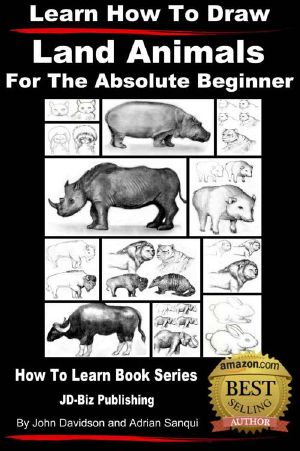Learn How to Draw Land Animals - For the Absolute Beginner (Learn to Draw)

- Authors
- Davidson, John & Sanqui, Adrian
- Publisher
- JD-Biz Corp Publishing
- Tags
- art
- Date
- 2013-10-28T00:00:00+00:00
- Size
- 1.13 MB
- Lang
- en
Learn How to Draw Land Animals For the Absolute Beginner
Adrian Sanqui and John Davidson
TABLE OF CONTENTS
Introduction: Drawing tools
Sketching Animals
The contour shape
The planes
Details
Furs
Raccoon
Lion
Bison
Texture
Armadillo
Elephant
Prints
Tiger
Shading
Linear shading
Imaginary light source
Tapir
Smeared shading
Hippopotamus
Rhinoceros
Gaur
Sketching Animals - The contour shape
To properly construct the figure of any subject you want to illustrate, observe the structure of its form and find what kind of shape that can resemble its body structure.
The idea is to have a basis for portraying the mass of the figure. The basic shapes can be easily positioned upon your desired perspective or point of view.
•Obtain the most basic form of the animal you are going to draw.
•Use the basic form as a reference for constructing the main outline.
The main outline is the most important element for the subject to be distinguishable. Remember that the basic figure (basic shapes) is mainly a basis for its mass in the simplest form, this is just a way for you to see the subject as a multidimensional figure, and any change in position will gradually change the manner of how the figure should be outlined.
The primary outline may overlap, replace, or replicate the basic figure.
If the portions of your animal are smoothly spherical (circles used to simplify the form), then the primary outline would simply overlap or replicate the simplified form, but if the part has ridges such as the face of the animal (nose, eyeholes, cheeks etc...) then the basic form should be modified to illustrate the exact shape of the head.
•The basic forms will be your guide to properly lay out each linear shade.
Observe the first sphere. The linear shades do not bend properly with the contour shape but it can show the dimensions by leaving the center of the sphere unmarked. These are hatches that use the point of light as a reference.
The linear shades on the second sphere bend with the contour shape of the figure. The lines show the proportions by interpreting the form by flowing with it. These hatches use the point of light and the manner of its bend to show dimensions.
If you are going to use a single set of hatches to shade the subject, use the method of the second sphere, and then use the method of the first sphere to darken and enforce the visual depth.
Thin and light linings are used to portray the dimensional shape. Follow the contour figure of the basic form to properly portray the shade values according to its perspective